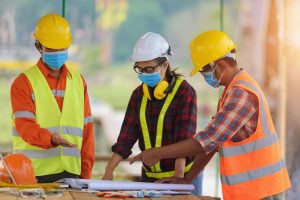The California Division of Occupational Safety and Health (Cal/OSHA) encouraged the state’s employers and workers to follow recently updated guidance from the California Department of Public Health (CDPH) recommending that all individuals wear face coverings while indoors regardless of COVID-19 vaccination status.
In California, masks are recommended for everyone in indoor settings and required for everyone who is not fully vaccinated. Masks are required for everyone on public transit (in airports and stations and on buses, planes, and trains) and in childcare settings and K-12 schools, cooling centers, healthcare settings, jails and prisons, and shelters.
Counties within California may have tighter face covering requirements.
Earlier in the summer, California’s Occupational Safety and Health Standards Board revised and reauthorized the state’s COVID-19 emergency temporary standard (ETS), which initially took effect in November 2020. Once emergency rules are approved by the Office of Administrative Law, the rules go into effect immediately and remain in effect for 180 days. The standards board may twice readopt temporary standards for 1 additional 90-day period each. The board may readopt the COVID-19 ETS one more time.
California also has a permanent aerosol transmissible disease standard that applies to correctional and healthcare facilities and emergency services.
MIOSHA encourages following CDC guidance
The Michigan Occupational Safety and Health Administration (MIOSHA) encouraged employers to follow updated recommendations for the fully vaccinated from the Centers for Disease Control and Prevention (CDC) due to the Delta variant of COVID-19.
The CDC recommends that fully vaccinated people:
- Wear a mask in public indoor settings if they are in an area of substantial or high transmission.
- Consider wearing a mask regardless of the level of transmission, particularly if they or someone in their household is at increased risk for severe disease or is immunocompromised or if someone in their household is unvaccinated.
- Get tested if experiencing COVID-19 symptoms, get tested 3–5 days after exposure to someone with suspected or confirmed COVID-19, and wear a mask in public indoor settings for 14 days after exposure or until they receive a negative test result.
- Isolate if they have tested positive for COVID-19 in the prior 10 days or are experiencing COVID-19 symptoms.
According to the CDC guidance, outdoor settings pose minimal risk to those who are fully vaccinated, and most indoor activities pose low risk, especially in areas with low or moderate transmission. However, fully vaccinated people who become infected with the Delta variant can transmit it to others.
NSC statement of Pfizer vaccine approval
The National Safety Council (NSC) expressed support for widespread vaccination after the Pfizer-BioNTech COVID-19 vaccine received full approval. On August 23, the Food and Drug Administration (FDA) granted full approval to the Pfizer-BioNTech COVID-19 vaccine. The Pfizer-BioNTech vaccine has been available under an emergency use authorization since December 11, 2020. The NSC encouraged employers to follow its recommendations on vaccination.
The NSC’s employer recommendations included providing paid time off for vaccination and recovery, offering scheduling and transportation support, coordinating on-site vaccination clinics, encouraging peer-to-peer communication about vaccination, and contacting state officials about local vaccination efforts.

